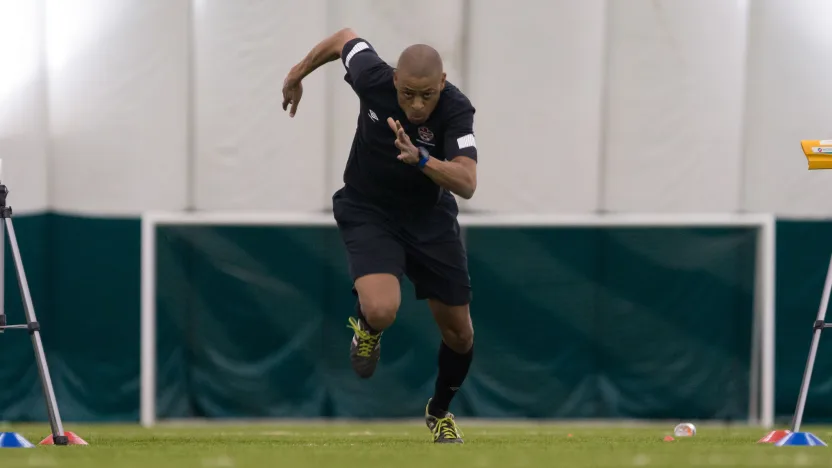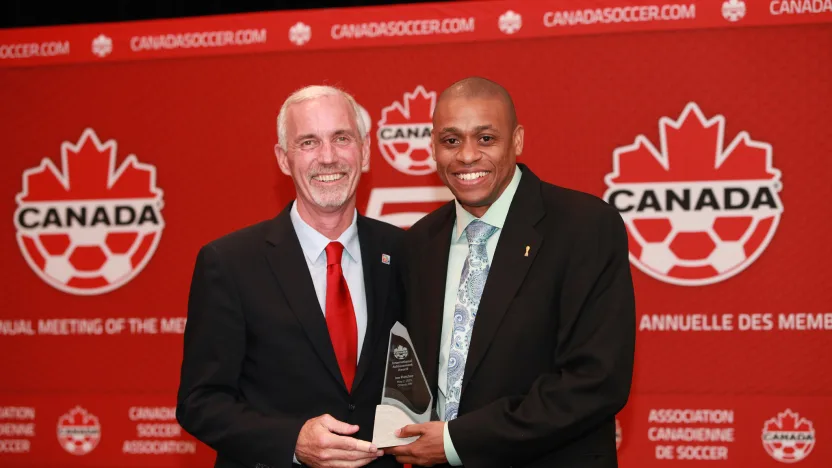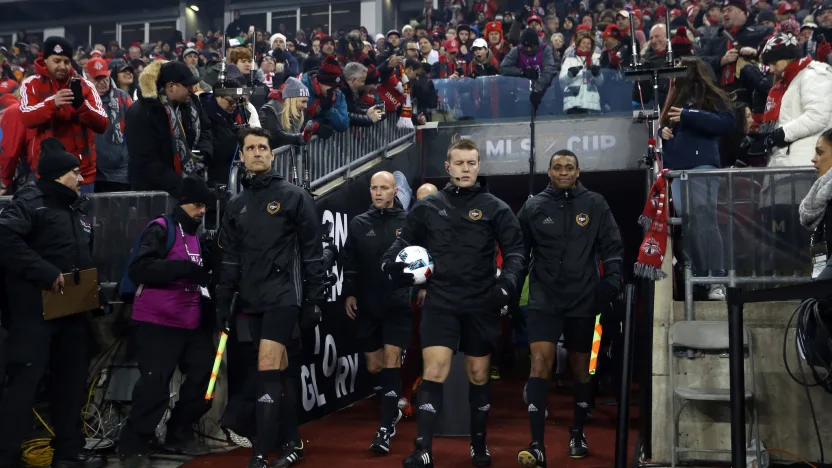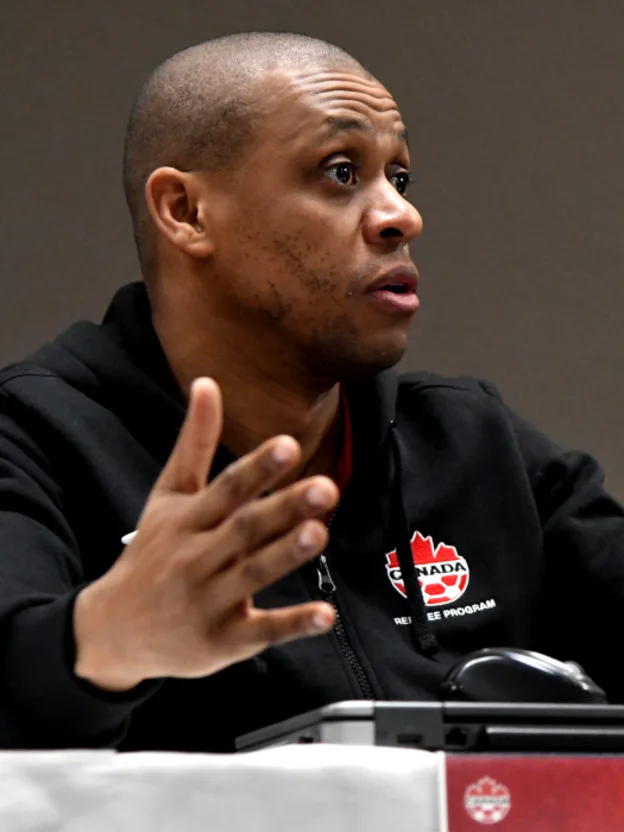Canadian assistant referee Joe Fletcher has seen it all — World Cups, Champions Leagues, fixtures in every confederation … the biggest matches the world will ever know.
A FIFA-listed official for more than a decade, Fletcher announced his retirement late last year, leaving the touch-line with an enormous amount of adoration and memories a fraction of referees will ever know.
In an hour-long conversation with CanPL.ca this week, the 42-year-old reflected back on a career with a perspective that’s not often told, as he prepares to work with Canada’s national referees ahead of the CPL’s inaugural season.
Why did he retire? What’s it like being part of the biggest show on earth? What role will he fill with the CPL? And, in perhaps the most interesting piece to this extended Q&A, the Canadian referee looked back on a Colombia-England World Cup fixture that drew ire from all corners of the globe.
Larson: Why was it time to retire?
Fletcher: It has to end at some stage. Most of us go until we slow down or suffer injury or, basically, your skill level drops off to the point they just don’t want you anymore. My situation was unique because I managed to make it to the World Cup, the pinnacle. My buddies and I always swore to ourselves we weren’t going to try and referee on the way down. I didn’t want to referee just because I could. I made the decision after World Cup 2018 that I wasn’t going to chase the World Cup in 2022. It wasn’t going to be the same amount of fun without (retired American referee Mark Geiger). Maybe I could have made 2022, maybe not. But if I would have gone there, it would have felt like less of an experience and I would have really struggled to look my family in the eyes.
Larson: From where I’m sitting, it appears you’ve done it all.
Fletcher: I feel like I ran out of boxes to tick. I managed to do everything I wanted to do. I refereed in every confederation. I have a full-time job, so I couldn’t use the argument that I needed to stick around to earn a few extra dollars. I couldn’t justify being away from home. I didn’t want to just work in MLS or just work in the CPL. I didn’t want to go halfway because my entire career was about chasing something and accomplishing something. If I wasn’t going after a World Cup, I thought this was the time. Let’s go out before I screw something up.

Larson: What’s something fans and players – really, everyone – doesn’t understand about being a high-level referee?
Fletcher: Clubs know the referees so they know what to expect. If you’re the new guy, you’re getting grief for the sake of getting grief. If you’re the guy who has been there and you’re a drill sergeant half the time, they know you and tell you to lighten up. If you’re a “players’ referee” they’ll do their best to take advantage of you because players are out for every competitive advantage they can get. If that means “working the referee” to try and get a call then that’s in their favour. It would be foolish to think players give you a pat on the back for no reason because you’re a human being and eventually you’ll have a 50-50 decision involving that guy. What do you think the human being inside you wants to do?
Thankfully there’s no audio broadcast live because the professional referee has to either say nothing and shut-up or if you’re going to entertain a player and go back-and-forth you have to be really good on your feet and really quick-witted. There are a whole lot of those “battles” that happen and you don’t want to get caught in a place where they say something or you say something stupid because that’s going to get repeated. I’ve been sworn at more times and in more languages than I care to talk about. It’s amazing that you learn to keep really level-headed.
Larson: Do you learn not to take things personally?
Fletcher: No, because there are some things I do take personally. If someone dropped a racial comment to me I’d get pissed. I don’t take the high road on that. I have zero tolerance.
Larson: What’s it like to know your performance will be examined just as much as the players you’re officiating?
Fletcher: Whatever I do has to fit with the show. It has to be defendable on TV. Somebody is going to come out and say, “You gave 18 free kicks to one team and nine to the other team and it wasn’t fair.” Everything has to stand up to five different replays, a whole bunch of commentators and the press. I have to make sure the show makes sense so they can’t blame me. You can’t get out of being discussed. It’s going to happen. They’ll discuss it. That’s fine. What I can’t do is get blamed. That’s the big difference between refereeing at the highest level. There needs to be talking points. You don’t want to be the talking point that mattered.

Larson: You refereed in a World Cup (2014) without VAR and a World Cup (2018) with VAR. Did you sleep better at night last summer knowing the big calls would be reviewed?
Fletcher: No. I also had to act as a VAR last summer. Let’s get something straight: The system? I like it. The design of it? Great. Does it remove all errors? No. It’s supposed to remove (big refereeing errors). But my fear was working in the video room as the offside guy. For instance, if I put a bad flag up and it’s close people will say, “He only had one chance and didn’t have the benefit of replay.” If you miss when you’re the video official and you get a bunch of replays at your disposal, nobody will understand that.
Are we in a rush in that room? Hell yes. Two minutes feels like an eternity in a stadium. Probably the most stressful thing I’ve seen is when you’re trying to decide at a World Cup whether to send a referee to the video monitor. After that your job is done because everyone knows a video referee thinks it’s wrong. If you forget or miss it or interpret something wrong … try and defend that the next day! If I send a referee there and I’m wrong and he disagrees, the big fear I had — and thank God it didn’t happen — was missing something altogether and then going into the locker room and the referee asking how I didn’t send something to him. It’s different sitting and watching a game and analyzing it. But if you’re on the field, it’s nice having that back up.
Larson: What is your best memory as an official?
Fletcher: I remember at this World Cup the chats I’d have with guys at the corner flag or during any kind of stoppage. I remember one conversation with (England fullback) Ashley Young. He thought there was a head-butt (in the Colombia match). I thought there wasn’t. There was a delay in the game and you’re sitting there for 30 seconds. I got a whole bunch of friends messaging me because they showed clips of me chatting with (Young). People who aren’t in the refereeing world were asking, “What was he saying? What was that like?” To do something for so many years and finally hear from people outside the soccer world was really neat.

Larson: I was in Moscow for the World Cup’s Round of 16. I thought your crew handled the England-Colombia game quite well. Others … didn’t
Fletcher: So, let’s think. We finished (Portugal-Morocco) and the losing team complained that Mark (Geiger) asked for Ronaldo’s shirt, which was the stupidest thing ever because we’re all mic’d up all game and the entire thing is recorded. Did they just want to hear what the radio conversations were? There was no chance of that being true. And I know that because I heard the entire thing. I was listening in on the entire game. There’s no part of Mark asking for a shirt.
Colombia-England you had one team playing without their talisman in James Rodriguez. So, they knew that the way England was playing they were a clear underdog and they weren’t going to win a technically masterful match. They needed to muddy it up a little bit to beat England. They knew that. When they go home, it’s one thing to get beat, but you don’t want it to be on you — especially for the South Americans. If you just look at this as an assessor, for example, I’m trying to think of what breaks Colombia didn’t get. The England free kick that was granted where a player might have been head-butted was just a caution. One team wanted red, one team wanted yellow. Colombia got yellow. The PK was about as clear as day because the guy literally jumped on Harry Kane’s back. They fought about that for two minutes in the game. I don’t think for a second they didn’t believe it wasn’t a penalty. The review was quick. That was about doing whatever they could — the dark arts of the game — to hopefully freeze the kicker …
Larson: How do you explain the criticism Geiger and your crew received after that game?
Fletcher: It’s because (Geiger’s) an American. If you were to take his nationality and make him from Italy or Paraguay or one of the bigger confederations, maybe he gets less. “What do Americans know about soccer?” is usually the cry from most of the world. The idea was, “Why is there an American doing this level of match?” He was behind the eight ball before he started. He had to deal with that beforehand. He was already down. So, you get a game like England-Colombia — two continents clashing — and you know one has to lose and be able to blame something or someone.
The easiest target is the referee. Mark is an English-speaker. The story could have been, ‘Everybody favours England.’ That was being said before we kicked off. So, you know you’re going into that game and it’s going to be difficult for them to even assign you again because if they appoint you again people are going to talk about the last match you called. It was always going to be difficult. If I was FIFA I probably wouldn’t have played it differently. Here’s why: Mark had proven through training and seminars that he was one of the better VARs in the world. They even used him for training videos FIFA put out. So, if I’m FIFA and I had eight elite referees I knew I could use in the later rounds it would make a whole lot of sense to put Mark in the room and another guy on the field. They didn’t want VAR to fail. The World Cup is the biggest proving ground. I think they were justified in how they played their cards because Mark ended up doing the last couple of rounds. I think it made a lot of sense. It didn’t shock me to end up in the video room on Match 63.
Larson: Give me a player you respected for how they handled themselves and interacted with you.
Fletcher: I had the Americans a few times at Gold Cups. I took a goal away from Landon Donovan in their first game. We were in the tunnel for the next game I had the Americans and Donovan came out and said, “Hey, I looked back at that call. You were right.” It was interesting that he cared enough to remember that.
Larson: And your worst moment?
Fletcher: During a friendly in 2009 I gave a caution from the line to the wrong guy. There were two guys who came in. The one guy was smart and took off and I ended up giving a caution to the wrong number. It was a friendly, so it was the right place for a mistake to happen, but just imagine if that guy was already on a yellow or I missed a red card or the guy did something stupid later in the game. Thankfully we have VAR now for mistaken identity. I remember that happening and being like, ‘Wow, that wasn’t good.’
Larson: Were you lucky to not have made bigger errors in your career or were you just that good?
Fletcher: I can be lucky that some of my errors didn’t result in goals. I can be lucky that if I missed a call it didn’t turn into a game-winning goal. I can be lucky it happened in an MLS regular season game. If I miss an offside call by a few inches, it sucks, but at least I can comprehend it due to the margin of error. But I’m super lucky none of those things happened to me during a playoff game or in a Champions League game or in a FIFA tournament. One mistake changes careers. I’ve been at Gold Cups where a guy makes a mistake and the next thing you know he’s not a FIFA referee in two years. Or, if you make a mistake at a FIFA tournament and they say, “Well, we just can’t assign you anymore.” I saw that happen in Brazil. There’s an element of luck involved. I was just good enough to not mess up when the stakes weren’t as high.
Larson: You’re good friends with Mark Geiger, an American referee who receives a lot of attention. Here’s your opportunity to set the record straight with Geiger.
Fletcher: How do I best defend Mark? He’s good enough and trusted enough to be able to be in a position where people will give him that much crap. It is not easy to come from CONCACAF and go to a World Cup and have the FIFA panel trust and respect you. It’s not easy to become a trusted set of hands where England is playing and the bosses say, “OK, I trust you.” Chile-Spain and the world champions are on the brink? “No problem. We’ll send you.” So, he does well at a World Cup and comes home and everyone expects perfection. Even when you go to the World Cup the flack he got had more to do with where he was from more than anything. He was good enough to be able to get enough heat. Howard Webb got the same stuff in England. You’re amazing internationally and a pariah at home. Why? Because they give you every big game and they see you all the time and you’re bound to upset somebody and you’re going to get grief for it.
Larson: How do you see the CPL impacting Canadian refereeing?
Fletcher: We’re going to Bradenton for national camp and we’re going to be training everybody to get ready for the league. They’re going to have to learn to work within the professional environment because it’s no longer about doing one match and leaving. These guys are going to be working throughout an entire season. You’re going to start to develop relationships with some of the players. It’s going to happen. So, when you start to earn the respect of the players it has been my history that you run into less problems. There’s less cheating to win. You can modify behaviour. If you’re not willing to work with the players then the league as a show won’t work. I don’t know if the league will end up with a point of emphasis.
Larson: Is there an opportunity here to develop more high-level referees in Canada?
Fletcher: The CPL will be the bridge for someone else to get an international badge where they’re really going to learn their craft at the pro level. You have to understand the travel that comes with professional and international refereeing and all of the things that are outside the 90 minutes. You have to develop those habits — working with players in a game that’s just faster and better than your local league. You have to learn to deal with players at a better level. You don’t want to sit there and try to make a miraculous jump. You won’t be ready. So, this league is going to be great for players and referees.
